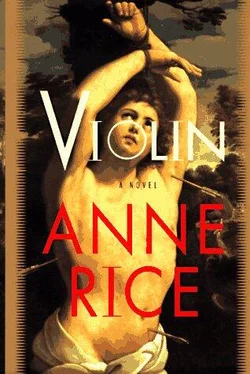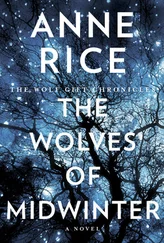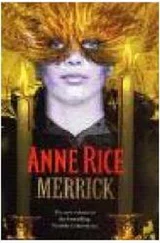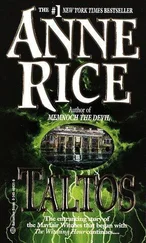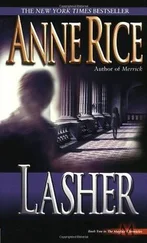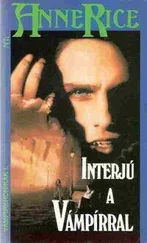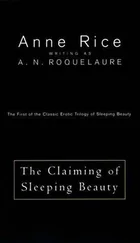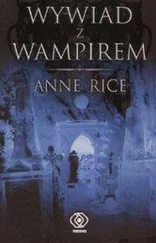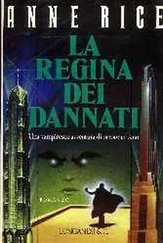...And let that blood come together.
I lowered the instrument. I was drenched in sweat. My hands tingled, and my ears were stung with the sound of clapping hands.
The old Count rose to his feet. Those in the hall crowded into the room.
"You write this in the air," said the Count.
I looked for ghosts. There were none.
"Come, we must record this music. This is natural; this is not learned. This is a savant gift and it has not demanded the usual price."
The Count kissed my face.
"Where are you, Stefan?" I whispered. "Maestro?"
I saw no one but the people crowded around me.
Then Stefan's voice in my ear; his breath on my ear.
Not done with you yet, you vicious girl who took it from me! It's not your talent!
It's not. It's witchery.
"No, no, you're wrong," I said, "it wasn't witchery, it was some thing loosed and unwound and unsafe, like the night birds that fly at sunset in a great gust from beneath a bridge. And Stefan, you were my teacher."
The Count kissed me. Did he hear my words?
Liar, liar, thief
I turned in a circle. The Maestro was most certainly and com pletely gone. I didn't dare to call him back. I didn't dare to try, that is, because I didn't know how to call him or Stefan in the first place.
"Maestro, help him," I whispered.
I lay against the Count's chest. I smelled his old skin, nice, familiar in its oldness like the skin of my father before he died, and sweet with a clean powder, no doubt beneath his clothes. His lips were wet and soft, and his gray hair soft. "Maestro, don't leave Stefan here, please . .
I gripped the violin. I held it with both hands, tight, tight, tight.
"It's all right, my dearest girl," said the Count. "Oh, what you have given us!"
Chapter 16
What you have given us. What was it, this orgy of sound, this outpouring that became so natural that I had no doubt of it? This trance into which I could slip, finding the notes and cutting them loose in certain strokes of will, with prancing and eager fingers?
What was this gift, to let the song surround me as it unfurled, to see it build and tumble down on me like gentle swaddling for a cradle? Music. Play. Don't think. Don't doubt. And don't doubt or worry if you think and doubt. Just play. Play it the way you want to play it, and discover the sound.
My beloved Rosalind came, quite dazzled to be in Vienna, with Grady Dubosson, and before we left, they opened the Theater an der Wien for us, and we played in the little painted place where Mozart had once played, where The Magic Flute had once been performed, in the building where Schubert had lived and written music-the tight, glorious little theater with the gold balconies stacked steeply and dangerously to the top-and after that we played once in the grand gray Opera House of Vienna, only steps from the hotel, and the Count took us into the country to see his sprawling old house, the very kind of country villa once owned by the Maestro's brother, Johann van Beethoven, "landowner,"
to whom the Maestro, in a letter, had so artfully replied, "Ludwig van Beethoven, brain owner."
I walked in the Vienna Woods, a sweet and mellow forest. I was a living woman with my sister.
At home, scholars reported on Karl's work. The book on St. Sebastian was in proofs with an excellent publishing house, one that Karl admired. There had been immediate acceptance.
I was freed of that. It was done as well as ever he could have wished it. Roz and Grady traveled with me.
The music was mine and the concerts came one after the other. Grady spent his life on the phone with bookings.
The money flowed into the charities for those who had died unjustly and horribly in the wars. For the Jews, first and foremost, in honor of our great-grandmother, who had cast off her Jewish identity for Catholic in America, but more purely for justice, if not for her, and then for whatever charity we chose.
In London, we made the first recordings.
But there was St. Petersburg before that, and Prague, and the countless random concerts on the street, for which I was as greedy as a dancing school kid who twirls under every lamppost. I loved it.
In every swoon, I told the beads of the Rosary of my early years, the sweet years, drowned in the softest shades of purple and red. I beheld only the Joyful Mysteries.
"And the Angel of the Lord declared unto Mary, and she conceived of the Holy Ghost."
It was with the fearless vigor of undefeated and unblemished childhood.
At home, Karl's bo6k went to press at great expense, each color print personally supervised by the finest in the field of such publishing.
I slept at night on fine sheets. And woke to look on splendid cities.
Royal suites became the order of the day for Rosalind and me. Glenn soon joined us. Rolling tables draped in floor-length linen and cluttered with silver covers and heavy forks. Grand stairways and long corridors with Oriental rugs became our wandering ground.
But I never let the violin get away from me. I couldn't hold it eternally, that seemed mad, but I kept my eyes on it when I sat in the tub, staring at it, watching for it to be snatched, for some invisible hand to take it away into a vacuum.
And at night, I lay beside it, violin and bow folded over and over and over in soft baby-blanket wool and bound to me by leather belts which I didn't show to anyone else; and most of every day, I held it, or kept it by my chair.
There was no change in it. Others inspected it, declared it priceless, genuine, asked to be allowed. I couldn't let them play. It was not deemed a selfish thing, but only a prerogative.
In Paris, when Katrinka and her husband, Martin, met us, we bought Katrinka fine coats and dresses-all kinds of pocketbooks and high heeled shoes that neither Roz nor I could have possibly worn. We told Katrinka to do the limping for all of us. Katrinka laughed.
Katrinka sent her daughters, Jackie and Julie, boxes of exquisite things. Katrinka seemed freed from a great and tragic burden. Little or nothing was said of the past.
Glenn sought out old books and recordings of European jazz stars. Rosalind laughed and laughed. Martin and Glen. went off together to the old famous cafes, as if they could really find Jean-Paul Sartre if they looked hard enough. Martin was always on the phone, closing an Act of Sale on a house back home, until I begged him to take over the management of the endless trek for all of us.
Grady was relieved; we needed him as much as ever.
Laughter. Had Leopold and little Wolfgang ever had so much fun? And let us not forget there was a girl child there, a sister who was said to play as exquisitely as her prodigiously talented brother. A sister who had married and given birth to children rather than symphonies and operas.
Nobody could have ever been happier than we were on the road.
Laughter was our natural tongue once more.
They almost threw us out of the Louvre for laughing. It was not that we didn't love the Mona Lisa. We did, only we were so very excited and so bursting with life. We could have kissed strangers, obnoxiously, but we had better sense, and we hugged and kissed one another.
Glenn walked ahead of us, smiling sheepishly and then laughing too because it was too much happiness to disregard.
In London, my former husband, Lev, came with his wife, Chelsea, my sometime friend, and now seeming sister, and the black-haired boy twins, pristine and well behaved, and the tall, blond, beautiful eldest son, Christopher. It made me cry to see this boy, whose laugh did make me think of Lily.
Lev sat in the front row of the concert hall when I played. I played for Lev, for the happy times, and later he said it was like that drunken picnic of years before-only riskier, more ambitious, more fully realized. I was dazed with old love. Or love that is everlasting. He brought his keen academic words to the thing.
Читать дальше
